|
|
|
Sort Order |
|
|
|
Items / Page
|
|
|
|
|
|
|
| Srl | Item |
| 1 |
ID:
167310
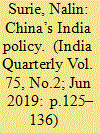

|
|
|
|
|
| Summary/Abstract |
Given the essential positive history of China’s relations with India, China’s world view and the fact of geographical contiguity, the essential approach that China follows vis-à-vis India post 1949 is based on bilateralism. The bilateral approach has defined China’s negotiations over the border as well as economic relations between the two. In the past bilateralism has allowed China to consolidate its control over Tibet and follow a mercantilist economic policy vis- a- vis India. But the change in the geopolitical status of both nations indicates that bilateral relations, after Wuhan, have been reset to represent those between two ‘major powers’ who have broader regional and global interests as well. Although bilateralism will continue to underline their policies towards each other in matters of common development, regional development or the building of a community with a shared future for humanity, China will need to redefine its approach to bilateralism by broadening and deepening it to create a truly mutual relationship.
|
|
|
|
|
|
|
|
|
|
|
|
|
|
|
|
| 2 |
ID:
181685
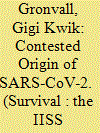

|
|
|
|
|
| Summary/Abstract |
This article describes what is known about the origin of SARS-CoV-2, with implications for policy, biological research and public-health surveillance. Theories about the origin include a natural emergence; a laboratory accident with a naturally harvested strain; an accident with a naturally harvested strain modified in a laboratory; and the deliberate creation of a biological weapon. While available scientific evidence points to a natural zoonotic event as the origin of SARS-CoV-2, this paper recommends specific steps governments and scientific institutions should take to address uncertainties about the origin of the COVID-19 pandemic, as well as to make all potential causes for a pandemic less likely to produce one in the future. Immediate steps include promoting international scientific collaboration, addressing scientific misinformation and disinformation, fully implementing ‘One Health’ and reining in the illegal wildlife trade.
|
|
|
|
|
|
|
|
|
|
|
|
|
|
|
|
| 3 |
ID:
176514
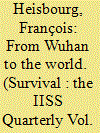

|
|
|
|
|
| Summary/Abstract |
The COVID-19 pandemic has reinforced the power of the state in its traditional role as protector of society from outside threats.
|
|
|
|
|
|
|
|
|
|
|
|
|
|
|
|
| 4 |
ID:
171586
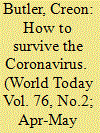

|
|
|
| 5 |
ID:
175388
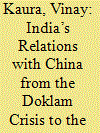

|
|
|
|
|
| Summary/Abstract |
No other bilateral relationship for India is as complex and challenging as the one with China. The intractable border dispute is at the root of their rivalry. The military stand-off at Doklam in 2017 had poisoned the bilateral relationship until steps were taken to remove mistrust and misunderstanding through two ‘informal’ summits between Prime Minister Narendra Modi and President Xi Jinping in 2018 and 2019. Nonetheless, the sense of general improvement in Sino-Indian ties generated at Wuhan and Mamallapuram was shattered by China’s aggressive behaviour in June 2020 at the Galwan Valley in Ladakh along the Line of Actual Control (LAC). The article traces key events during the Doklam stand-off and the violent military clashes at Galwan, as well as the steps taken by India to enhance political trust at the highest level. It contends that since there has been no change in China’s policies on a range of issues that are critical for India, it is not possible for India to remain ambivalent on how to deal with China. The article concludes that there seems to be greater recognition of the challenge from China and the need to recalibrate the Indian response.
|
|
|
|
|
|
|
|
|
|
|
|
|
|
|
|
| 6 |
ID:
130434
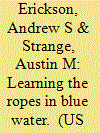

|
|
|
| 7 |
ID:
114801
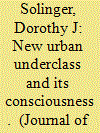

|
|
|
|
|
| Publication |
2012.
|
| Summary/Abstract |
This paper investigates whether the 22 million or so urban recipients of the Minimum Livelihood Guarantee (the zuidi shenghuo baozhang), whose per capita family income falls below a locally set poverty line, can be called a 'class'. It also explores if they experience 'class consciousness'. It draws on theoretical writings on class and class consciousness, and on some seven dozen unstructured interviews in households of urban dibao recipients in Lanzhou, Guangzhou, Wuhan, and three smaller Hubei cities in 2007-2010, mainly using material from 2010. It finds that, unlike the former working class, while these people do not comprise a 'class' as such, their consciousness of their plight, stripped bare of all the illusions that clouded it in Maoist times-again as distinguished from the bygone working class-is more faithful to their actual circumstances than it is specious.
|
|
|
|
|
|
|
|
|
|
|
|
|
|
|
|
| 8 |
ID:
182981


|
|
|
|
|
| Summary/Abstract |
The COVID-19 pandemic caused a lockdown of Wuhan, and strict control was imposed in many major Chinese cities, including the national capital of Beijing. Residents’ committee workers at the grass-roots level have played a critical role in the enforcement of the government’s pandemic prevention and control measures, through their day-to-day service and surveillance as local community managers. This article examines their work in Wuhan and Beijing neighbourhoods during the most critical periods of the outbreak, from late January to June 2020, and the challenges the workers faced as executors of the government’s community-based prevention policy. The two cities have developed different community strategies because of very different epidemiological situations and city functions.
|
|
|
|
|
|
|
|
|
|
|
|
|
|
|
|
| 9 |
ID:
119185
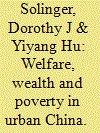

|
|
|
|
|
| Publication |
2012.
|
| Summary/Abstract |
In the broader social science literature, most studies of social protection investigate welfare in democracies, and at the national level, and typically assume that welfare is given in order to influence voting. This paper, to the contrary, considers social assistance in authoritarian China at the urban level. Its findings are compatible with an explanation that there are two dissimilar logics influencing the distributional decisions of lower-level administrators. That is, there appear to be two modes of social policy implementation, which vary with the fiscal capacity of a given city, as indicated by its average wage: Wealthier cities seem to prefer to push off the streets those viewed as unsuited to a modern city, therefore allocating a substantial proportion of their social assistance funds to them, in order to entice them to stay at home. On the other hand, poorer places seem to permit such people to work outside, in the hope that they will thus be better able to support themselves, thereby saving the city money. A data set from China's Ministry of Civil Affairs was used.
|
|
|
|
|
|
|
|
|
|
|
|
|
|
|
|
| 10 |
ID:
177952
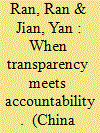

|
|
|
|
|
| Summary/Abstract |
Existing studies of Chinese officials’ blame avoidance behavior argue that Chinese officials’ motivation for blame avoidance comes from top-down performance evaluation and responsibility attribution pressures and Chinese officials tend to deflect the blame downward to lower levels. Nevertheless, at the early stage of the COVID-19 outbreak in Wuhan, local officials made the unusual move of deflecting blame upward onto the central level and both central and local actors became embroiled in a blame game that took place against the backdrop of recent recentralization drive. To better explain this puzzle, this article examines how bottom-up public demands for transparency as well as top-down responsibility attribution pressures together shape the motivations, strategies, and interactions of central and local officials in this blame game. Our research shows that the public appeals for transparency stoked the top-down responsibility attribution pressure, further reinforcing local officials as well as the center’s motivation to avoid blame at the early stage of the COVID-19 outbreak in Wuhan. Local officials and central public health technocrats engaged in a blame game that played out in various media outlets. To insulate itself from public criticism and prevent the blame game from getting out of hand, the center ultimately responded by moving to hold local officials accountable through its propaganda and cadre disciplining apparatus.
|
|
|
|
|
|
|
|
|
|
|
|
|
|
|
|
|
|
|
|
|